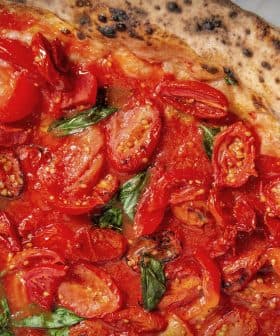Olive Oil is Key to Promoting Plant-Forward Diets, Report Says
The white paper, which was published by the Culinary Institute of America and the International Olive Council, also says that a shift to plant-forward diets is necessary to achieve global climate goals and promote healthy eating.
The Culinary Institute of America and the International Olive Council published a white paper outlining strategies to promote olive oil consumption and plant-forward diets globally, aiming to improve environmental sustainability and health. The paper was well-received at a conference, with the CIA emphasizing the importance of understanding and articulating the benefits of the Mediterranean diet and olive oil in achieving these goals.
The Culinary Institute of America (CIA), in conjunction with the International Olive Council (IOC), have published a white paper laying out a series of strategies to promote consumption of olive oil and plant-forward diets around the world.
The paper was presented at a conference earlier in the summer and Greg Drescher, the vice president of strategic initiatives and industry leadership at the CIA, told Olive Oil Times that it was well-received by other industry professionals.
We need to be able to better articulate what olive oil and the Mediterranean diet have to offer.
“There was a sense that this is a significant contribution to furthering our understanding of the opportunities that the olive oil kitchen presents within this current set of concerns around health and the environment and the need to move toward more plant-based dietary products,” he said.
According to the CIA, the two main goals of plant-forward cooking are to improve environmental sustainability around the food chain and foster healthier eating habits.
See Also:Mediterranean Diet News“In addition to clean energy, plant-forward diets are going to be essential to meet our climate challenges,” Drescher said.
The Mediterranean diet – which emphasizes the consumption of fruits and vegetables, whole grains, legumes, nuts and seeds and olive oil – is a prime example of a plant-forward diet that has worked for centuries.
“We don’t need to necessarily invent new foods or new dietary patterns,” Drescher said. “We can be inspired by what already exists rooted in cultures.”
The CIA and IOC believe that increasing olive oil consumption is a complementary goal to promoting a shift toward plant-forward cooking. The two organizations addressed strategies by which to do so within the white paper.
“A lot of people understand the general concept without necessarily understanding a lot of the specifics underlying the concepts of the Mediterranean diet, which is really rooted in the olive oil kitchen,” Drescher said. “We need to be able to better articulate what olive oil and the Mediterranean diet have to offer.”
“The white paper really delves into a lot of culinary strategy and areas of specific development within the Mediterranean kitchen and the olive oil kitchen that will be valuable to public health and climate experts as they recommend culturally based models for sustainable eating,” he added.
Among these culinary strategies is the more extensive use of aromatics to flavor food, as opposed to relying solely on meat. Leveraging smaller portions of animal-based proteins, which is frequently done in Mediterranean cuisine, is another strategy. Drescher believes that olive oil plays a big part in both of these strategies.
A practical example that he cites is switching from meat-based sauces to nut and olive oil-based ones.
“Many chefs from a variety of cultures around the world have trouble imagining sauces that are not meat-based,” he said. ”The Mediterranean olive oil kitchen has a wide variety of nut sauces that are some combination of olive oil, nuts, herbs, spices, garlic and other aromatics. These stretch from Spain to the Middle East and North Africa and are absolutely delicious.”
In the United States, which consumes more food per capita than almost every other country according to data from Oxford University, plant-based sauces, such as hummus, are growing in popularity.
Drescher attributes this to the steadily increasing availability of hummus in supermarkets and restaurants. He believes that increasing consumers’ access to these types of products will go a long way in promoting plant-forward diets.
“It’s not just that we need to have wider consumer understanding, but we need to have wider accessibility for consumers so that it’s incumbent on chefs and restauranteurs and retailers to make more of those foods available,” he said.
In general, the U.S. appears to be fertile ground for expanding plant-forward diets. According to a recent Nielsen Homescan study, 39 percent of Americans said they were actively trying to eat more plant-based foods.
The CIA and IOC believe that promoting plant-forward cooking can help boost this figure and push plant-centric eating programs, such as the Mediterranean diet, more into the forefront of American culinary culture.
Drescher believes that knowing how to use and cook with extra virgin olive oil is key to achieving these goals. To illustrate this point, he cites something Antonia Trichopoulou, a professor of biochemistry at the University of Athens, once told him.
“It’s not that we Greeks necessarily like vegetables any more than you Americans do,” she said. “The difference is in how our vegetables are prepared: with olive oil.”









